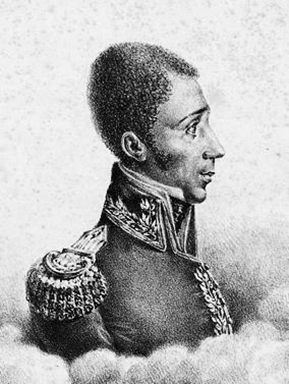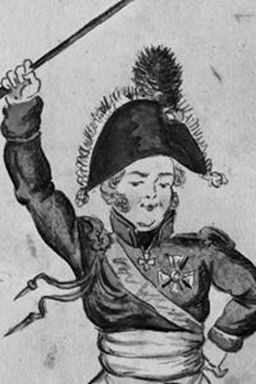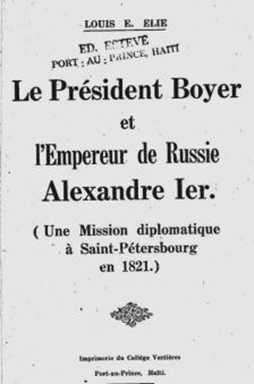"Boyer and Boyé’s Diplomatic Mission to Russia" by Louis E. Elie
An excerpt from Elie’s Le Président Boyer et l’Empereur de Russie Alexandre Ier (1942). Elie was a Haitian historian who wrote several books around the mid twentieth century, such as Histoire d’Haïti (1944). In the excerpt below, he explains how President Boyer deployed an old friend, a French general named Jacques Boyé, to negotiate a trade treaty with the Russian Czar Alexander I.
When President Jean Pierre Boyer came to power (1 April 1818), he sought to consolidate the Republic, founded in 1807 by the magnanimous Alexandre Pétion. Here is what Alexandre Lilavois, a great Haitian writer, had to say: "While the future of nation was secure from the inside, the head of state could not hide from the bigger problem presented by the outside world, that there was still no solution to secure complete autonomy [… Thus] in preparation, he did not hesitate to create for the Republic new political relationships to help counter-balance the influence of the former metropole in Haiti and facilitate future negotiations to secure recognition of [Haiti’s] independence by the French government. It was then that the president remembered that he could employ General Jacques Boyé, a former superior officer of the Leclerc expedition (in 1802), as an intermediary to present a proposition to the Russian government."
To understand why the President of Haiti chose a French general as his representative to the Court of Russia, consider this explanation by Beaubrun Ardouin. "Several weeks after [General Alexander] Pétion’s weapons were seized [by the French midway in the Haitian Revolution], Jean Pierre Boyer was arrested in Port-au-Prince, where he was without work… While in prison, he wrote to Jacques Boyé, an adjunct general who was formerly the colonel of the Légion de l’Ouest. It was this officer, who was very friendly toward men of color and blacks, who went aboard [a French] ship and recommended Boyer to the officers and even the admiral."
The mission that the President of Haiti entrusted to Jacques Boyé, improvised diplomat, had a precise purpose. It was to dispel old misunderstanding that between 1814 and 1821 had precluded any rapprochement, political or commercial, between France and its former colony, preventing any resolution to Europe’s hostility toward Haiti. Above all it was also to establish between Russia and the small Antillean Republic a genuine trade treaty that would neutralize and thwart the fatal influence of France.
For this very difficult mission, Haiti’s representative employed all the best resources of his intelligence and good faith. At first, the success of the mission seemed doubtful, as the Compte de Divoff, the head of [Russia’s] Ministry of Foreign Affairs… tried to discourage General Jacques Boyé. In categorical terms, he pointed out how Russia would risk its own prestige and dignity with such a hazardous intervention at a time when the 1814 Treaty of Paris had restored order in French parliament.
But Jacques Boyé was not one to get discouraged by his initial failures. Determined to achieve a successful conclusion, he was courteous, elegant, and spirited toward Alexander I who, himself, was a kind man with infinite passion, even as a master of absolute power without limitations.
One thing to note at the end of this study is that the Emperor of Russia, in his many efforts in favor of Haiti, never acknowledged the principal of the indemnity of 150 million francs that [Haiti paid to] dispossessed French colonists. The Emperor of Russia never spoke a word about the injurious levy on our independence by royal ordinance [in 1825].


